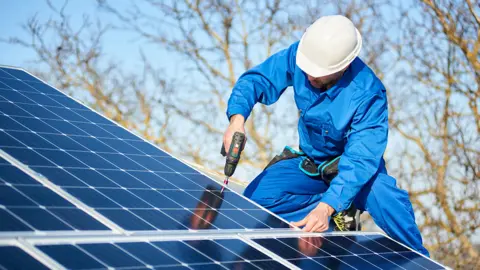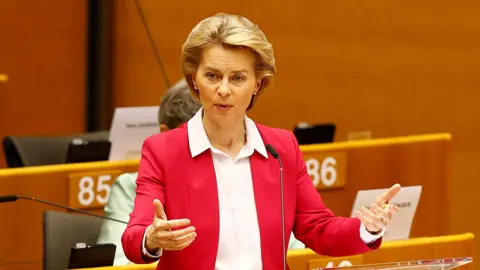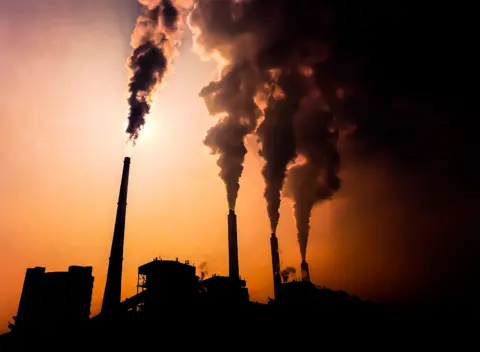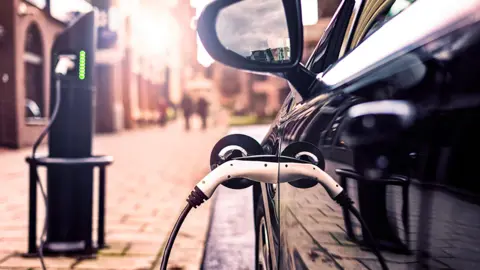Climate change: How a green new deal really could go global
 Getty Images
Getty ImagesGood news is in short supply at the moment, so brace yourself for a rare burst of optimism about climate change.
World leaders know their countries face one of the most severe recessions in history thanks to the coronavirus restrictions.
That presents a unique challenge, but also a massive opportunity.
Politicians know they are going to need to spend huge amounts of money to kick-start economic activity as the threat of coronavirus finally recedes.
It is a one-off, never-to-be-repeated chance to transform their economies. So the question is, what will they spend it on?
'Europe's moment'
This week the European Union put its cards on the table. On Wednesday it unveiled what it is billing as the biggest "green" stimulus package in history.
"This is about all of us and it is way bigger than any one of us," announced Ursula von der Leyen, the European Commission president, when she told European Parliament members what was planned. "This is Europe's moment," she said.
As well as being a big step towards federalism, the recovery package puts fighting climate change at the heart of the bloc's recovery from the pandemic.
The scale of what is being proposed is mind-boggling. The headline figure is €750bn, but add in spending from future budgets and the total financial firepower the European Commission says it will be wielding is almost €2tn ($2.2tn).
There will be tens of billions of euros to make homes more energy efficient, to decarbonise electricity and phase out petrol and diesel vehicles.
The idea is to turbo-charge the European effort to reduce carbon emissions to net zero by 2050.
"If we do not do it we will be taking much more risk," Teresa Ribera, the deputy Prime Minister of Spain told me.
"The recovery should be green or it will not be a recovery, it will just be a short-cut into the kind of problems we are facing right now."
 Getty Images
Getty ImagesA Green New Deal
If you are thinking this is just something that sandal-wearing European liberals might get behind, think again.
Donald Trump may be an avowed supporter of fossil fuels, but his Democratic opponent in the November presidential election is not.
Joe Biden is reckoned to be planning a similarly huge green stimulus package for the US.
The model is the vast investment projects of the New Deal that helped lift America out of the Great Depression in the 1930s.
That was the defining policy of President Franklin Delano Roosevelt.
Biden is reportedly preparing for his own "FDR-size presidency", according to New York magazine.
"He knows he needs youth enthusiasm, he knows he needs the left, he knows he needs the core democratic base, and he knows climate is probably the best issue to get that," explains energy and climate analyst David Roberts of the US website Vox.
"Climate polls the best across all those groups, climate even polls pretty well among wavering Trump voters," he says.
Why now?
This is not just about rallying voters. There are sound economic reasons why politicians see green technology as a prudent investment.
First off, renewables are now often cheaper than fossil fuels in large parts of the world.
The technologies are proven and can be built at scale today.
And most importantly, their cost follows the logic of all manufacturing - the more you produce, the cheaper it gets.
The same logic applies to hydrogen and to electric vehicles. But it does not apply to fossil fuels, whose cost ultimately relies on mining ever more difficult and dwindling resources.
And that contains the seductive promise that a huge government push to scale up solar and wind will make them even more affordable compared with coal, oil and gas - not just in the US, but globally.
So the argument goes that renewables provide a pathway for clean growth in the future.
Develop innovative new electric vehicles, wind turbines, ways of making homes energy-efficient, energy storage technologies or even new ways of configuring electricity grids and you are likely to find ready markets around the world in coming years.
Equally importantly, renewable technologies offer something else that will be needed in the years to come: the potential to create huge numbers of new jobs.
The Covid-19 crisis has driven joblessness to near Great Depression levels around the world - worse even than in the wake of the 2008 financial crisis.
Around 40 million Americans are unemployed.
Worldwide, 1.6 billion people are reckoned to be in immediate danger of losing their livelihoods, according to the International Labour Organisation.
That means governments need to find ways to employ lots and lots of people.
Renewable technologies offer precisely the kind of "shovel-ready", large-scale and labour-intensive infrastructure projects politicians are looking for.
There is the obvious stuff - building wind turbines, solar farms and the foundations of a hydrogen economy - but think also about installing networks of charging points for electric vehicles, the need to insulate homes or revamp urban transport systems.
Just like the road and dam building of the American New Deal, projects like these could employ tens of thousands of people in high-skilled and - crucially - local jobs.
 Getty Images
Getty ImagesThe China question
But here's the rub. China currently looks set to take a very different route to recovery.
It remains the biggest piece of the climate change puzzle. China produces almost a third of the world's emissions, as much as the US and the EU combined.
Last week, the country's top legislative body, the annual National People's Congress, was in full session.
The country already has a big expansion of coal-fired electricity generation underway. There was no suggestion this would be reversed.
After the financial crisis in 2008, China ramped up coal-fired power stations as a key part of its stimulus package. But there is still a lot to play for this time round, says Li Shuo, an energy expert with Greenpeace East Asia in Beijing.
Few details of the Covid recovery plan were announced at the NPC, and he says much will depend on what American voters decide in November.
"The US position looms very large in China's political calculus," explains Mr Li.
He believes President Trump's energy policies are one of the major barriers to China raising its climate ambitions.
"I think there is a feeling here in China that it is unfair for Beijing to move forward with its climate agenda at the same time as the US is moving backwards."
That said, the Chinese public certainly seems to support measures to decarbonise the economy.
Eighty-seven percent of Chinese people see climate change as serious a threat as Covid-19, according to a poll conducted in 14 countries by Ipsos MORI in April.
Even in America, where support was lowest, 59% of people agreed that the risks of climate change matched those of the coronavirus in the long term.
Nearly two-thirds of all respondents and 57% of Americans said it was important that government actions aimed at economic recovery prioritised action on climate change.
 Getty Images
Getty ImagesKnock on effects
And once big economies like Europe and the US adopt policies like these, there is good reason to think other countries will follow suit.
One of the most striking - and controversial - aspects of the European plan is that it will be funded in large part by debt raised by the European Commission itself.
That represents a significant deepening or European integration that some member states have already signalled they will resist.
Under the proposal the hundreds of billions of euros of debt would be serviced by new EU-wide taxes.
One option being discussed is a carbon tax that would include levies on imported goods with a high carbon footprint.
Think about what that means.
Countries that want to sell into the largest economy in the world would now face penalties unless they make efforts to clean up their energy systems.
Now imagine that America embarks on a Green New Deal. It might choose to introduce a similar tariff.
But I opened this piece offering optimism, so let me present an alternative path.
The countries that decarbonise first could lead by example. Remember, the more renewables you produce, the cheaper they get.
As low carbon technologies increasingly undercut the fossil fuel alternatives, you won't need a stick to beat other countries into changing their ways - they will just follow the money.
You see where this is headed.? Maybe we are not as far away from widespread coordinated action on climate change as many people fear.
As I said at the start, a rare opportunity for optimism amongst the gloom of this present crisis.
You can hear a radio programme Justin made with producer Laurence Knight about how plans for gigantic government investments to decarbonise the world economy are gaining traction on the World Service's Business Daily. Click here.
